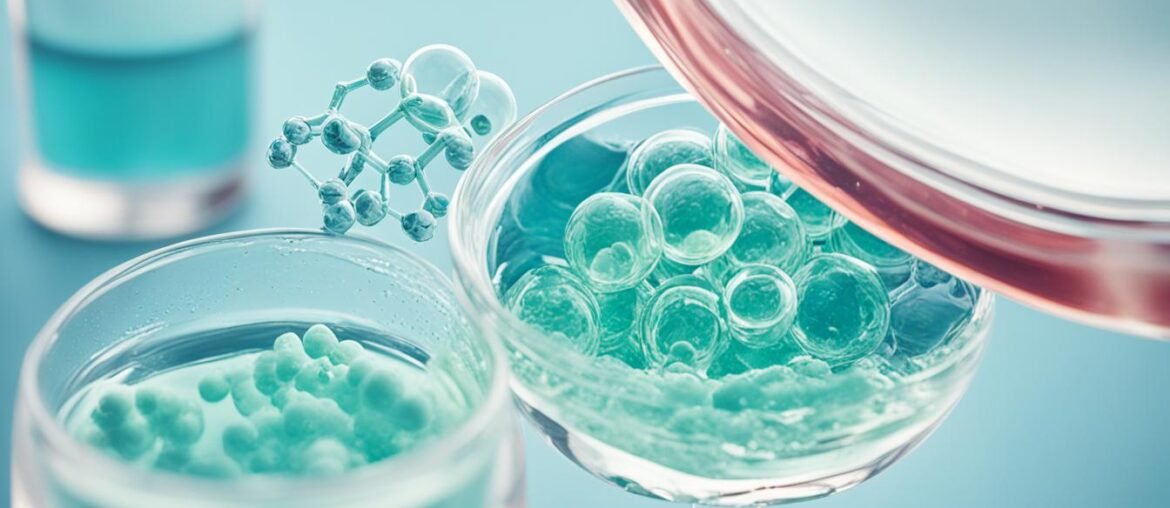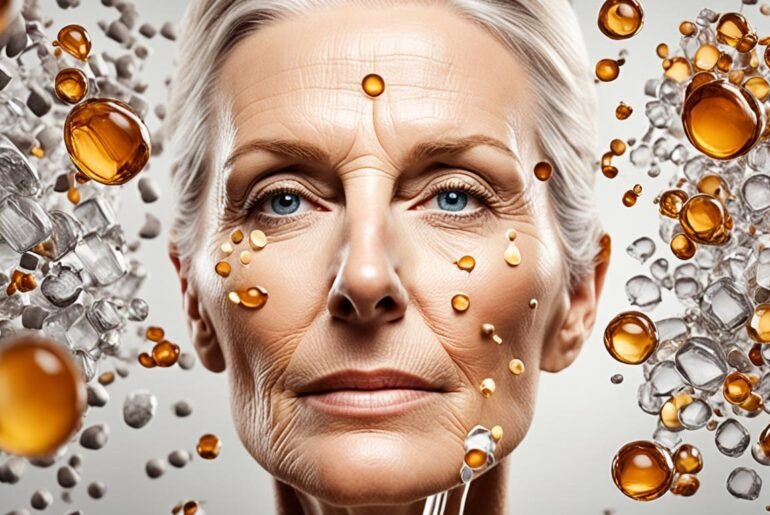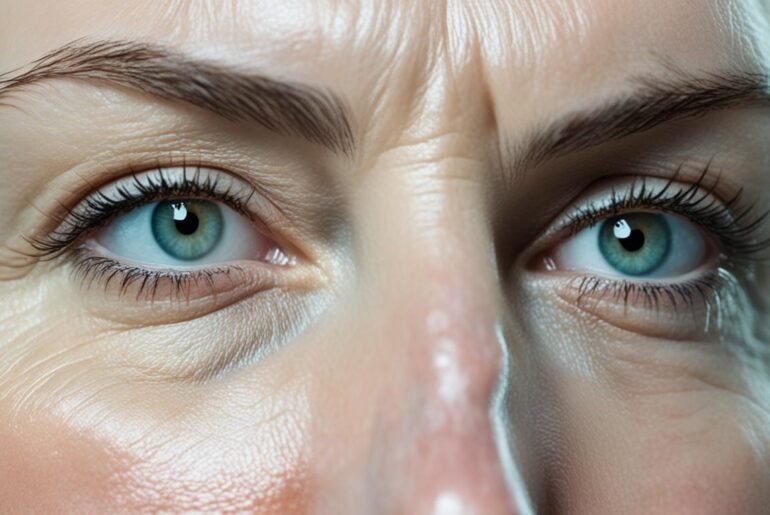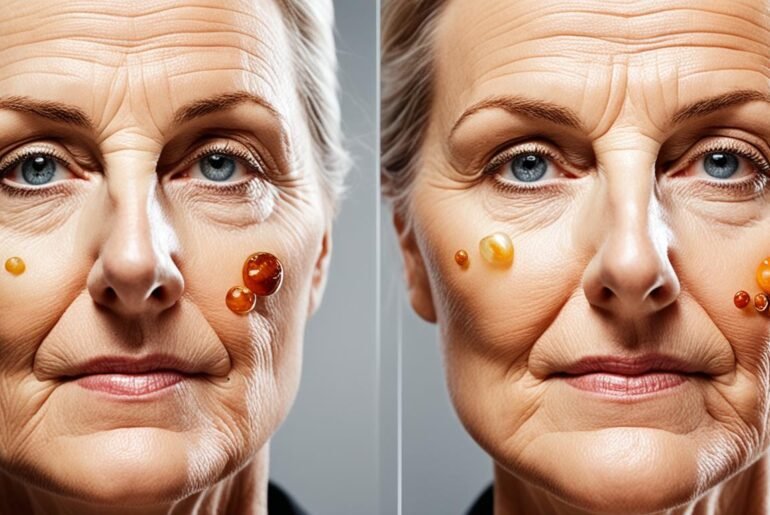Did you know that alcohol consumption can have a detrimental effect on the antioxidant defense of your skin? Research has shown that alcohol-induced oxidative stress can accelerate skin aging and damage skin health.
Alcohol affects the skin’s antioxidant system, which is responsible for protecting against free radicals and maintaining the health and youthfulness of the skin. When this defense system is impaired, the skin becomes more vulnerable to the damaging effects of alcohol and other environmental factors.
Understanding the impact of alcohol on the skin is crucial in maintaining skin health and preventing premature aging. Let’s explore the relationship between alcohol and your skin, and discover strategies to mitigate the effects of alcohol on your skin’s antioxidant defense.
Key Takeaways:
- Alcohol consumption can accelerate skin aging and damage skin health.
- Alcohol impairs the skin’s antioxidant defense system, leaving it more vulnerable to the damaging effects of free radicals.
- Research has shown associations between alcohol consumption and various signs of skin aging, such as wrinkles and visible blood vessels.
- Under-eye puffiness, acne, psoriasis, and rosacea can all be exacerbated by alcohol consumption.
- Adopting lifestyle habits such as reducing alcohol consumption, staying hydrated, and maintaining a good skincare routine can help combat the effects of alcohol on the skin.
The Relationship Between Alcohol and Your Skin
The skin, being the body’s largest organ, serves as an important reflection of overall health. When it comes to alcohol consumption, there is a notable connection between alcohol and the well-being of the skin. The effects of alcohol on the skin can manifest in various ways, including under-eye puffiness, acne, accelerated skin aging, exacerbation of psoriasis, and worsening of rosacea. These outcomes are influenced by factors such as inflammation, oxidative stress, and impaired antioxidant defense.
“Alcohol and its impact on the skin are intertwined, affecting its health and appearance.”
The Effects of Alcohol on the Skin
The consumption of alcohol can lead to under-eye puffiness, commonly referred to as “bags under the eyes.” This can be attributed to alcohol’s dehydrating effect, which disrupts the body’s fluid balance. Furthermore, alcohol and its metabolites can trigger inflammation, exacerbating acne breakouts. The inflammatory response induced by alcohol can also accelerate the aging process of the skin, resulting in wrinkles, fine lines, and sagging.
Individuals with psoriasis may experience heightened symptoms due to alcohol consumption. Alcohol-related inflammation can worsen the severity of psoriasis and affect specific areas of the body, such as the face, groin, and joints. Similarly, alcohol-induced flushing and vasodilation can contribute to the redness and visible blood vessels associated with rosacea.
The Relationship in Detail
To further understand the impact of alcohol on the skin’s health, let’s explore some key relationships:
- Alcohol and under-eye puffiness: Alcohol disrupts the body’s fluid balance, leading to under-eye puffiness.
- Alcohol and acne: Inflammation caused by alcohol can exacerbate acne breakouts.
- Alcohol and aging skin: Alcohol accelerates the aging process, resulting in wrinkles, fine lines, and sagging skin.
- Alcohol and psoriasis: Alcohol-induced inflammation can worsen the severity of psoriasis.
- Alcohol and rosacea: Alcohol triggers flushing and vasodilation, worsening the symptoms of rosacea.
The negative effects of alcohol on the skin are evident across various skin conditions, making it vital to be aware of the potential consequences.
The Importance of Skin Health
Preserving skin health is crucial for maintaining a youthful appearance and overall well-being. Prioritizing healthy lifestyle choices and adopting a diligent skincare routine can help mitigate the effects of alcohol on the skin. By reducing or quitting alcohol consumption, staying hydrated, and following a consistent skincare regimen, individuals can support their skin’s ability to replenish and protect itself.
Alcohol and Under-Eye Puffiness
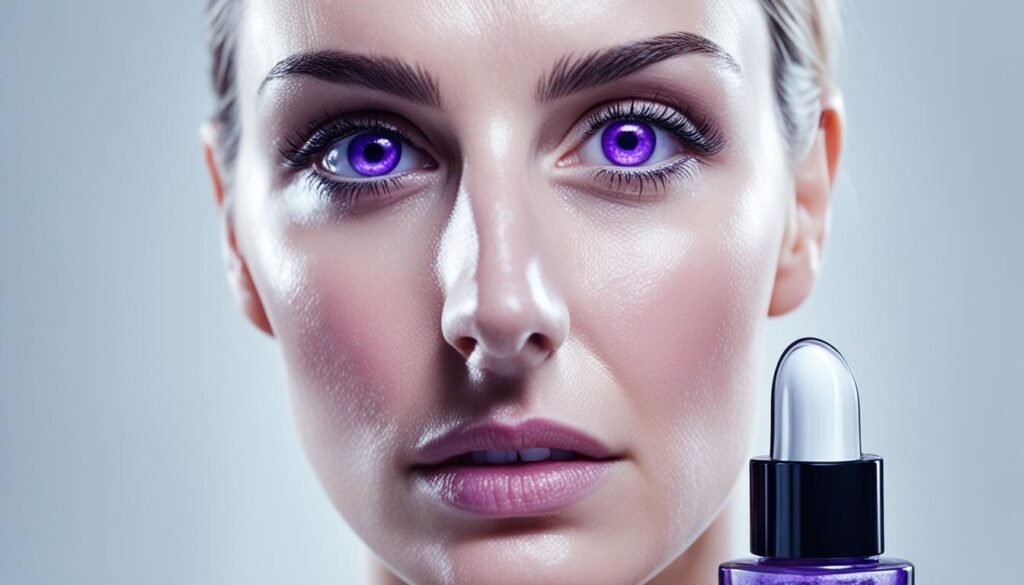
One common effect of alcohol consumption on the skin is under-eye puffiness. Even moderate drinking can cause puffiness and swelling in the under-eye area. This can be attributed to the dehydrating effects of alcohol and its impact on the body’s fluid balance.
Research has shown that under-eye puffiness is associated with drinking a combination of different types of alcoholic beverages. Individuals who consume a mix of beer, wine, and spirits may be more prone to under-eye puffiness due to their higher overall alcohol consumption. This effect can contribute to a tired and aged appearance of the skin.
| Effects of Alcohol on the Skin | Under-Eye Puffiness |
|---|---|
| Dehydrating effects | Increased fluid retention in the under-eye area |
| Overall alcohol consumption | Higher prevalence of under-eye puffiness |
Alcohol and under-eye puffiness go hand in hand. To minimize this effect, it is essential to moderate alcohol consumption and maintain a balanced fluid intake. Additionally, adopting a healthy skincare routine that includes moisturizing and using products specifically targeted for reducing puffiness can help restore a youthful and refreshed appearance.
Alcohol and Acne
Acne is a common skin condition that can be influenced by various factors, including alcohol consumption.
Although the direct link between alcohol and acne has not been scientifically proven, research has shown that inflammation plays a role in the development of acne.
Alcohol has been found to contribute to oxidative stress and inflammation in the body, which are known to be associated with acne formation.
While the specific mechanisms by which alcohol impacts acne are not fully understood, it is believed that the inflammatory effects of alcohol may exacerbate existing acne or contribute to its development.
In order to maintain healthy skin and reduce the risk of acne, it is important to consider the effects of alcohol consumption and make informed choices about its consumption.
Here is a table summarizing the potential effects of alcohol on acne:
| Effects of Alcohol on Acne | Impacts |
|---|---|
| Inflammation | Alcohol can contribute to inflammatory processes in the body, potentially aggravating existing acne or promoting its development. |
| Oxidative Stress | Alcohol-induced oxidative stress can disrupt the normal balance of antioxidants in the skin, potentially affecting acne formation. |
| Hormonal Imbalance | Excessive alcohol consumption can disrupt hormone levels, which may have an impact on sebum production and contribute to acne. |
| Dehydration | Alcohol is a diuretic and can lead to dehydration, potentially affecting the overall health and appearance of the skin. |
While more research is needed to fully understand the relationship between alcohol and acne, it is advisable to practice moderation when it comes to alcohol consumption and prioritize a balanced lifestyle for healthier skin.
Alcohol and Aging Skin
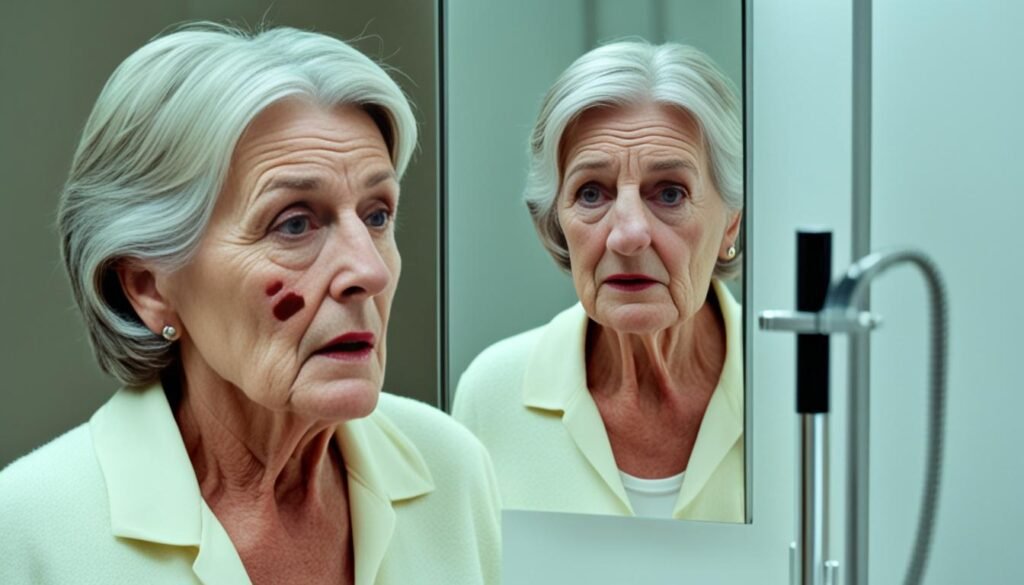
Alcohol consumption has profound effects on the aging process of the skin. Numerous studies comparing identical twins have highlighted the role of alcohol in contributing to the appearance of an aging face. Heavy alcohol use has been associated with several signs of more severe aging, including under-eye puffiness, midface volume loss, and blood vessels on the cheeks.
One of the key ways alcohol accelerates skin aging is by impairing the skin’s antioxidant defense system. The skin relies on antioxidants to protect against free radicals and the damaging effects of UV light. Alcohol-induced oxidative stress weakens the antioxidant defense mechanism, leaving the skin more vulnerable to environmental stressors.
Additionally, alcohol abuse can cause a decrease in facial fat volume, leading to midface volume loss commonly observed in heavy drinkers. This loss of facial fat contributes to a more aged appearance and enhances the visible signs of skin aging.
Understanding the detrimental effects of alcohol on aging skin is crucial for individuals who want to maintain a youthful and healthy complexion. Protecting the skin’s antioxidant defense system and mitigating the damage caused by alcohol-induced oxidative stress are essential steps in preserving its vitality.
| Effects of Alcohol on Aging Skin | |
|---|---|
| Under-eye puffiness | Increased blood flow to the delicate under-eye area, leading to swelling |
| Midface volume loss | Reduction in facial fat volume, contributing to a more aged appearance |
| Blood vessels on the cheeks | Dilated blood vessels, visible as red or purplish marks on the skin |
Protecting the skin from the aging effects of alcohol involves implementing measures such as reducing or quitting alcohol consumption, practicing a good skincare routine, and prioritizing hydration. By making these lifestyle choices, individuals can help counteract the negative impact of alcohol on the skin, maintain its youthful appearance, and support its overall health.
Alcohol and Psoriasis
Psoriasis is a chronic inflammatory skin disease that can be worsened by alcohol consumption. Studies have shown that individuals with psoriasis tend to have a higher-than-average alcohol consumption, and heavy drinking has been associated with more severe inflammation and an increased incidence of psoriasis.
Alcohol-induced inflammation plays a significant role in the severity and distribution of psoriasis. Individuals with psoriasis who are heavy drinkers often exhibit a distinct pattern of inflammation, primarily affecting the face, groin, and joint areas. While the exact mechanisms by which alcohol affects psoriasis are not fully understood, its inflammatory effects contribute to the worsening of the disease.
Research has shown that individuals with psoriasis tend to have a higher-than-average alcohol consumption, and heavy drinking has been associated with more severe inflammation and an increased incidence of psoriasis.
| Effects of Alcohol on Psoriasis | Severity of Psoriasis | Alcohol Consumption |
|---|---|---|
| Alcohol-induced inflammation worsens psoriasis | Heavy drinking is associated with more severe inflammation | Individuals with psoriasis tend to have a higher-than-average alcohol consumption |
| Distinct pattern of inflammation affecting the face, groin, and joint areas | Alcohol consumption contributes to the worsening of psoriasis | Increased incidence of psoriasis in heavy drinkers |
Individuals with psoriasis should be cautious about their alcohol consumption due to its potential exacerbating effects on inflammation and severity. Reducing or abstaining from alcohol can help manage and improve the symptoms of psoriasis. It is important to consult with a healthcare professional for personalized advice and a comprehensive treatment plan.
Alcohol and Rosacea
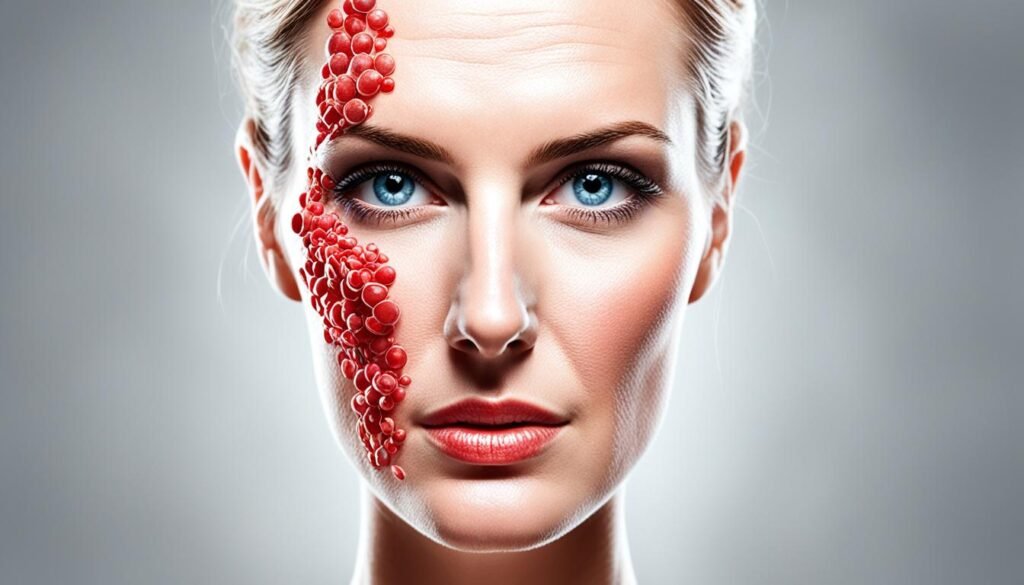
Rosacea is a skin condition characterized by visible blood vessels and a flushed appearance. It is often accompanied by redness, swelling, and a sensation of heat or burning on the face. While the exact cause of rosacea is unknown, there are certain triggers that can worsen its symptoms, and alcohol is one of them.
When alcohol is consumed, it can induce flushing in individuals with rosacea, leading to a temporary increase in redness and inflammation on the face. This flushing is caused by the impairment of the vasomotor center in the brain, which regulates blood vessel dilation. Alcohol dilates the blood vessels in the skin, resulting in a flushed appearance. Additionally, alcohol can trigger the release of various inflammatory mediators, exacerbating the symptoms of rosacea.
Inflammation and vasodilation are believed to be key factors in the development and progression of rosacea. Chronic inflammation can lead to the production of free radicals, which can further damage the skin and worsen the symptoms. The combination of alcohol-induced flushing, inflammation, and oxidative stress can result in increased redness, swelling, and discomfort for individuals with rosacea.
It is important for individuals with rosacea to be mindful of their alcohol consumption to minimize the impact on their skin. Limiting or avoiding alcohol altogether can help reduce the frequency and severity of flushing episodes, as well as decrease overall inflammation. Additionally, adopting a skincare routine specifically tailored for rosacea-prone skin can help manage the symptoms and maintain the health of the skin.
| Rosacea Triggers | Alcohol | Caffeine | Spicy Foods |
|---|---|---|---|
| Potential Impact | Induces flushing, triggers inflammation | Can cause flushing and increased skin sensitivity | May lead to flushing and irritation |
| Recommendations | Avoid or limit alcohol consumption | Moderate caffeine intake | Use mild spices and avoid excessive heat |
By understanding the relationship between alcohol and rosacea, individuals can make informed decisions to manage their condition and minimize its impact on their skin. Consulting with a dermatologist or healthcare professional can provide further guidance on lifestyle modifications, skincare products, and other treatments that can help control and alleviate the symptoms of rosacea.
The Worst Alcoholic Drinks for Your Skin

Not all alcoholic drinks have the same impact on the skin. Some beverages are worse for the skin than others. Here are some of the worst alcoholic drinks for your skin:
1. Dark Liquors
Dark liquors, such as whiskey, bourbon, and rum, contain chemicals called congeners. These congeners are difficult for the body to process and may have negative effects on the skin. Consuming dark liquors can increase the risk of skin inflammation and contribute to the development of skin issues.
2. Red Wine
While red wine is often associated with potential health benefits for the heart, it can be detrimental to the skin. Unfiltered red wine can burden the liver and kidneys, leading to flushing, redness, and blotchy skin. The high levels of tannins in red wine can also contribute to skin dryness and irritation.
3. Sugary Cocktails
Sugary cocktails, especially those with high sugar content, can significantly impact the appearance of your skin. The high sugar content promotes inflammation and can damage skin cells, leading to premature aging and an increased risk of acne breakouts. Cocktails like margaritas, which contain both sugar and salt, can also contribute to puffiness in the skin.
To maintain the health of your skin, it is important to be mindful of the types of alcoholic drinks you consume. Opting for lighter-colored liquors and limiting your intake of sugary cocktails can help minimize the negative effects on your skin.
How to Combat the Effects of Alcohol on Your Skin
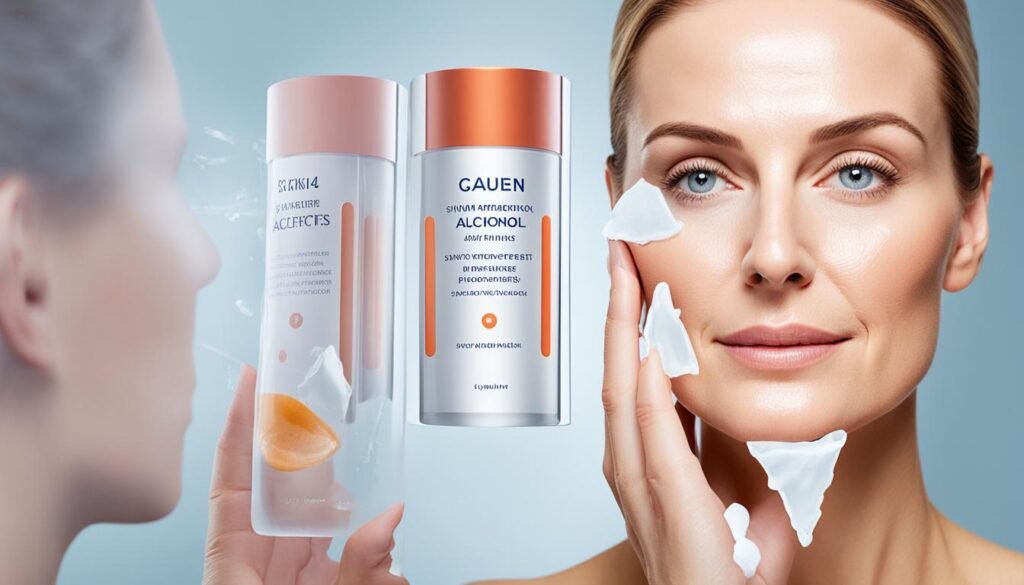
If you are concerned about the effects of alcohol on your skin, there are lifestyle habits you can adopt to minimize the impact. Quitting or reducing alcohol consumption can have significant benefits for the health and appearance of the skin.
Maintaining a one-to-one ratio of water to alcohol can help counteract the dehydrating effects of alcohol. Staying hydrated is crucial for maintaining the skin’s natural moisture and preventing dullness and dryness.
A good skincare routine, including regular cleansing and moisturizing, can help support the skin’s health and minimize the damage caused by alcohol-induced oxidative stress.
Taking care of your skin through hydration and proper skincare can help mitigate the effects of alcohol on the skin. By following these lifestyle habits and incorporating a skincare routine specifically targeted towards alcohol-induced skin damage, you can combat the negative impact of alcohol and promote healthier, more vibrant-looking skin.
Conclusion
Alcohol has a significant impact on the antioxidant defense system of the skin, leading to accelerated aging and damage to skin health. The relationship between alcohol and the skin is complex, involving inflammation, oxidative stress, and impaired antioxidant defense. Understanding the effects of alcohol on the skin can help individuals make informed decisions about their alcohol consumption and take steps to protect their skin’s health.
To minimize the effects of alcohol on the skin, adopting certain lifestyle habits is crucial. Reducing or eliminating alcohol intake is one of the most effective ways to promote healthier skin. Additionally, maintaining hydration by drinking adequate amounts of water can counteract the dehydrating effects of alcohol and improve skin appearance.
Establishing a good skincare routine that includes regular cleansing and moisturizing can also support the skin’s health and minimize the damage caused by alcohol-induced oxidative stress. By prioritizing skin health and implementing these lifestyle habits, individuals can minimize the negative impact of alcohol on their skin and maintain a healthier complexion.
FAQ
What is the impact of alcohol on the skin’s antioxidant defense?
Alcohol consumption can have a significant impact on the antioxidant defense of the skin. It can lead to alcohol-induced oxidative stress, which accelerates skin aging and damages skin health.
How does alcohol affect skin health?
Alcohol consumption can worsen under-eye puffiness, acne, accelerate skin aging, exacerbate psoriasis, and trigger or worsen rosacea. These effects can be attributed to inflammation, oxidative stress, and impaired antioxidant defense caused by alcohol.
Why does alcohol cause under-eye puffiness?
Alcohol can cause under-eye puffiness due to its dehydrating effects and impact on the body’s fluid balance. Even moderate drinking can lead to swelling in the under-eye area.
Is there a link between alcohol and acne?
While the direct link between alcohol and acne has not been scientifically proven, alcohol can contribute to inflammation and oxidative stress, which are known to be associated with acne formation. Alcohol’s inflammatory effects may exacerbate existing acne or contribute to its development.
How does alcohol contribute to skin aging?
Alcohol consumption has been shown to accelerate the aging process of the skin. It impairs the skin’s antioxidant defense system, leaving it more vulnerable to the damaging effects of free radicals and UV light. Alcohol abuse can also lead to a reduction in facial fat volume, contributing to midface volume loss commonly seen in heavy drinkers.
Can alcohol worsen psoriasis?
Yes, alcohol consumption can worsen and trigger psoriasis. Heavy drinking has been associated with more severe inflammation and a higher incidence of psoriasis. Alcohol-induced inflammation is believed to play a significant role in the severity and distribution of the disease.
Does alcohol worsen rosacea?
Yes, alcohol consumption can worsen or trigger the symptoms of rosacea. It induces flushing by impairing the brain’s vasomotor center and causing vasodilation in the skin. This can exacerbate the redness and flushing associated with rosacea.
Are there any alcoholic drinks that are worse for the skin than others?
Certain beverages can have more negative effects on the skin. Dark liquors like whiskey, bourbon, and rum contain chemicals called congeners that can burden the body and potentially affect the skin. Red wine, especially unfiltered varieties, can lead to flushing and blotchy skin. Cocktails with high sugar content or containing both sugar and salt can also contribute to inflammation and skin damage.
How can I combat the effects of alcohol on my skin?
You can combat the effects of alcohol on your skin by reducing or quitting alcohol consumption, maintaining hydration by drinking enough water, and practicing a good skincare routine including regular cleansing and moisturizing. Taking care of your skin through hydration and proper skincare can help mitigate the effects of alcohol-induced oxidative stress.
What is the importance of understanding the impact of alcohol on the skin?
Understanding the impact of alcohol on the skin is crucial for maintaining skin health and preventing premature aging. It allows individuals to make informed decisions about their alcohol consumption and adopt lifestyle habits that protect and preserve the health of their skin.

